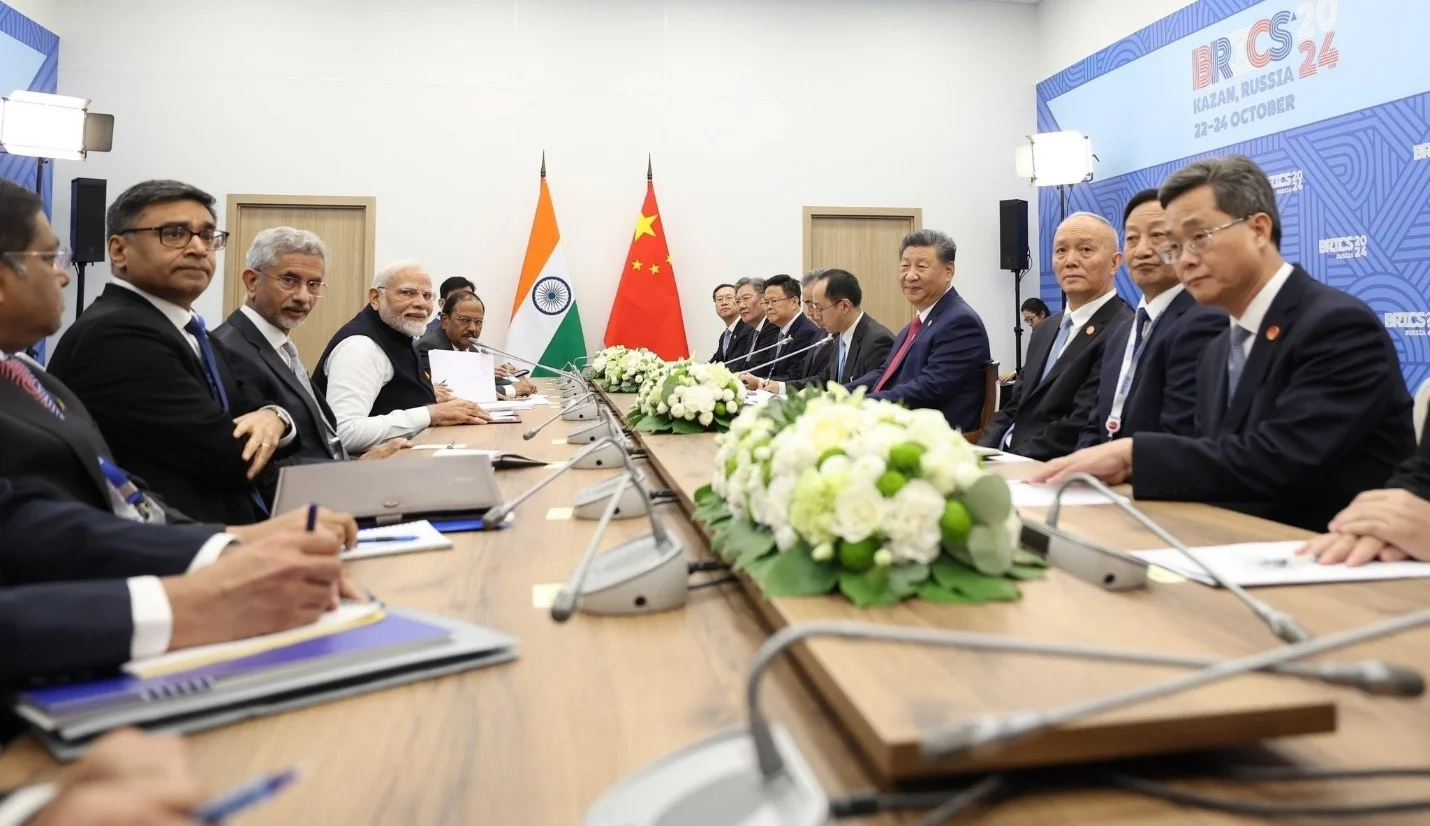Over the past decade, India has transformed its diplomatic posture, emerging as a nation that engages with intent, assists with compassion, and leads with purpose. The diplomatic wins of 2024, while remarkable, are the result of years of steady efforts to reshape how the world views India.
From bold moves like the 2016 surgical strikes and the 2019 Balakot airstrikes to extending a helping hand during the pandemic with Vaccine Maitri, India has shown it can lead with resolve and empathy. Initiatives like the inclusion of the African Union in the G20, the International Solar Alliance, and the Global Biofuel Alliance highlight its commitment to a fairer, sustainable future for all.
Under PM Modi’s leadership, India’s first-time visits to countries like Kuwait, Poland, Egypt, and Papua New Guinea revived long-dormant ties, reinforcing the message that India values relationships big and small. When crises arose, India didn’t just stand by. It acted. Operations like Ganga and Ajay ensured Indians were safely brought home from conflict zones, while aid to earthquake-hit Turkey and war-stricken Ukraine showed India’s solidarity with the world. Today India demonstrates that it is ready to engage, assist, and inspire in the global stage.
The year 2024 was a remarkable one for India’s diplomacy, solidifying its position as a global leader. This document highlights some of the key moments that shaped this journey
From hosting high-profile international leaders to playing a crucial role in global peace efforts, India’s diplomatic engagements have showcased its growing influence on the world stage. Here are some of the key diplomatic milestones and initiatives undertaken by India in 2024.
From Bastille Day to Republic Day
India’s ability to engage major world leaders on equal footing is evident from the invitation extended to the French President as the chief guest at India’s 75th Republic Day celebrations. This builds on the previous invitation by France to India, with PM Modi attending Bastille Day in July 2023. These exchanges reflect the deep trust and growing friendship between India and France.
Qatar Released 8 Indian Navy Veterans
India’s strong advocacy for its nationals marks a shift from its historically passive stance. A significant diplomatic win came when, due to the personal intervention of PM Modi, Qatar released eight former Indian navy personnel facing death sentences. This followed direct communication between PM Modi and Qatari Emir Sheikh Tamim bin Hamad Al-Thani, leading to a Qatari court commuting the death sentences to prison terms ranging from three to 25 years. Modi government’s swift action ensured safety, halted death sentences, and reunites Navy veterans with home[1].
The release of the veterans came just a day ahead of Prime Minister Modi’s February 13-14 visit to the UAE to inaugurate the country’s first Hindu temple, BAPS Mandir, in Abu Dhabi and meet the top leadership.
Halting of Ravi Water to Pakistan
Historically, India’s approach to the Indus Water Treaty (IWT) has been characterized by a relatively passive stance. Despite having rights over significant water resources, India largely adhered to the treaty’s provisions without fully utilizing its entitlements, allowing substantial amounts of water from the Ravi River to flow into Pakistan unutilized.
Today,India marked the completion of the Shahpur Kandi Barrage on the Ravi River, stopping the excess water flow to Pakistan, and signifying a strategic shift in water management.
It marks India’s assertive diplomacy, driven by national security concerns linked to terrorism. It highlights India’s strategic use of water as a diplomatic tool while asserting its rights under the Indus Water Treaty. This move would benefit the region of Jammu and Kashmir for agricultural purposes with potential to irrigate 4000 acre. Notably, the dam construction was completed after about three decades of laying foundation.[2]
India-China Agreement on Line of Actual Control (LAC)
Under PM Modi, after 2014 has been more robust military posture along the LAC and increased infrastructure development in border areas to strengthen India’s presence. The Galwan Valley clash in June 2020 marked a significant escalation in hostilities prompting India to ramp up troop deployments and infrastructure projects along the border. This year marked the ending four-year-long military standoff, India and China reached a significant agreement to disengage and resume patrolling in the Depsang Plains and Demchok areas along the Line of Actual Control (LAC), restoring the status quo as it was before the tensions in May 2020.[3]
This agreement marked a crucial step towards de-escalation and de-induction of troops in the India-China border areas, particularly in the strategically important Depsang Plains.
India: Peacemaker in Ukraine war
India’s stance that ‘this is not the time for war’ at the UN has resonated deeply with the world. India finds itself in a position to play peacemaker in the years-long Russia-Ukraine war.
President Putin expressed that India could be one of the mediators on the Ukraine war.[4] Poland’s Prime Minister Donald Tusk expressed his belief that India could play a crucial role in resolving the ongoing war between Russia and Ukraine.[5] Italian PM Meloni also expressed that India can play a role in finding a solutionto the Ukraine conflict.[6]
In mid-2024, Prime Minister Modi’s visit to Russia was marked by direct discussions with President Vladimir Putin about the need for peace talks. Shortly after, he visited Ukraine, where he expressed India’s readiness to play an active role in restoring peace.
India is a unique nation as it is increasingly being seen as a ‘Vishwabandhu’ striking a chord nations from either side of the divide. Former UN Security Council chief Kishore Mahbubani remarked on how few leaders could navigate such complex dynamics effectively, emphasizing India’s rising status as a major geopolitical actor .
India and Global South
India hosted the third Voice of Global South Summit. This Summit was the first plurilateral Summit hosted by the PM since the formation of the new Government on 9 June 2024.[7]
PM Modi’s visits to Guyana and Nigeria in 2024 reflect India’s strategic efforts to enhance its diplomatic presence in both the Caribbean and Africa.
G7 meeting in Italy
PM Modi was invited to the G7 even before winning the 2019 general elections, and it was the first global forum he attended after his victory. This marked a significant moment, as the world recognized Modi as one of the few global leaders securing a third term, signalling India’s political stability and PM Modi’s popularity. India participated in the 50th G7 Summit in Apulia, Italy, as an Outreach Country, marking PM Modi’s first overseas trip in his third term
End of Free Movement Regime with Myanmar
India decided to scrap the Free Movement Regime (FMR) between India and Myanmar to ensure the internal security of the country and to maintain the demographic structure of India’s North Eastern States bordering Myanmar.[8]
Rescue/Humanitarian Operations
Operation Indravati: India launched Operation Indravati to evacuate its nationals from Haiti to the Dominican Republic.[9]
Operation Sadbhav: India launched Operation Sadbhav to provide humanitarian assistance and disaster relief (HADR) to Laos, Myanmar and Vietnam
On December 10, 2024, India successfully evacuated 75 nationals from Syria.
The Chorus For India Middle East Corridor Grows Stronger
In February 2024, India and the UAE signed the first formal agreement on the development of the IMEC corridor. During PM Modi’s visit to Greece in the same month, Greek Prime Minister Kyriakos Mitsotakis emphasized that while the turmoil in Gaza and the Middle East is destabilizing, it should not undermine the strong logic behind IMEC. He further stated, “Nor should it weaken our resolve to work towards realizing it.”
India’s Takeover Of Chabahar Port Is A Big Deal
The development of Chabahar Port is viewed as a strategic counter to China’s influence in the region, particularly concerning Pakistan’s Gwadar Port. On May 13, 2024, India Ports Global Limited (IPGL) signed a long-term contract with Iran’s Ports and Maritime Organization (PMO) for the development and operation of the Shahid Beheshti Terminal at Chabahar Port.
This is India’s first full-scale management of an overseas port, boosting trade with Iran, Afghanistan, and Central Asia while bypassing Pakistan.
India signed a 10-year agreement with Iran for the enabling and development of the Shahid Beheshti Port Terminal at Chabahar Port.[10]
The Reset Of India-Maldives Relations
The relations between India & Maldives began to sour after Mohamed Muizzu won the presidency in November 2023 on a platform that included an “India Out” campaign. In reaction to PM’s visit to Lakshwadeep, Maldivian politicians, including Zahid Rameez from the Progressive Party of Maldives (PPM), made derogatory comments on social media. But India’s assertive and an emphatic diplomacy turned the tables. The turning point came during President Muizzu’s state visit to India from October 6-10, 2024 which aimed to reset strained relations. President Muizzu assured India that the Maldives would not engage in activities that undermine India’s security.
QUAD
The Prime Minister of India attended the Quad Leaders’ Summit in Wilmington (US). It reflects India’s growing role as a key player and its strategic positioning against challenges posed by China’s influence in the Indo-Pacific region
During the QUAD summit in the USA, India signed first-of-its-kind agreements focused on Clean Economy, Fair Economy, and the IPEF Overarching arrangement under the Indo-Pacific Economic Framework for prosperity.[11]
The leaders discussed enhancing semiconductor supply chains through a new Semiconductor Supply Chains Contingency Network Memorandum of Cooperation
Year of Historic Visits of PM Modi
Guyana in 56 Years (November, 2024)[12]
Visit to Guyana will be the first by an Indian Prime Minister since 1968.
Nigeria in 17 Years (November, 2024)[13]
Ukraine in 32 Years (August, 2024)[14]
It was the first visit by an Indian Prime Minister to Ukraine after establishment of diplomatic relations between the two countries in 1992.
Poland in 45 Years (August, 2024)[15]
Austria in 41 Years (July, 2024)[16]
PM Modi became first ever Indian pm to visit BruneiDarussalam (September, 2024)[17]. The visit coincided with 40th anniversary of establishment of diplomatic ties between India and Brunei.
Awards to PM in 2024
During his visit to Bhutan, the Prime Minister of India was conferred the ‘Order of the DrukGyalpo’, the highest civilian honor in Bhutan.[18]
Russia conferred Prime Minister Modi with their highest civilian honour – the Order of St. Andrew the Apostle in 2019. The PM received the award during his visit to Moscow in July 2024.
Dominica honoured PM Modi with the ‘Dominica Award of Honour.’ It was presented to PM Modi by President Sylvanie Burton of Dominica during the Prime Minister’s visit to Guyana in November 2024.
Nigeria honoured PM Modi with ‘The Grand Commander of The Order of the Niger’ during his visit in November 2024. It was presented to him by President Bola Ahmed Tinubu of Nigeria.
Guyana honoured PM Modi with the ‘The Order of Excellence’ during the Prime Minister’s visit in November 2024. It was presented to him by President Dr.Irfaan Ali.
M Mia Amor Mottley of Barbados announced her government’s decision to honour PM Modi with the Honorary Order of Freedom of Barbados Award during the Prime Minister’s visit to Guyana in November 2024.
A Win Of India’s Cultural Diplomacy
Opening of a Hindu temple in Dubai, exemplifies successful cultural diplomacy efforts that foster goodwill and strengthen ties with nations in the Middle East.
On November 15, 2024, the United States returned over 1,400 looted artifacts valued at approximately $10 million to India.
[1]https://www.facebook.com/watch/?v=767535151893889
https://www.facebook.com/drjitendras/videos/729295256042388/
[3]https://ddnews.gov.in/en/india-china-begin-disengagement-in-demchok-depaang-in-eastern-ladakh
[8]https://pib.gov.in/PressReleaseIframePage.aspx?PRID=2003884
[9]https://x.com/DrSJaishankar/status/1775918561820868756
[10]https://pib.gov.in/PressReleaseIframePage.aspx?PRID=2037450
https://www.mea.gov.in/rajya-sabha.htm?dtl/38631/QUESTION+NO+44+CHABAHAR+PORT+PROJECT
[11]https://pib.gov.in/PressReleasePage.aspx?PRID=2057489
[15]https://www.mea.gov.in/press-releases.htm?dtl/38179/Prime+Ministers+visit+to+Poland+and+Ukraine
https://www.narendramodi.in/highest-civilian-honours-bestowed-on-pm-modi-558974








